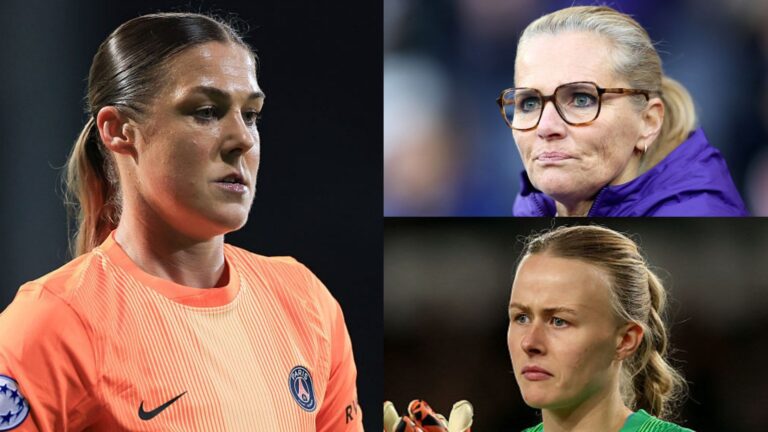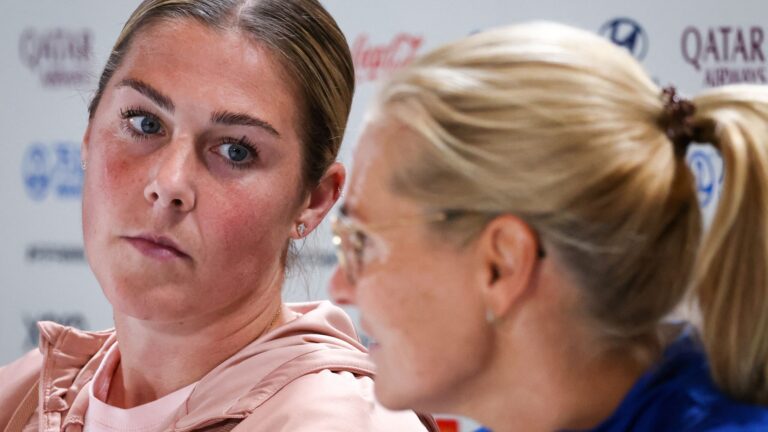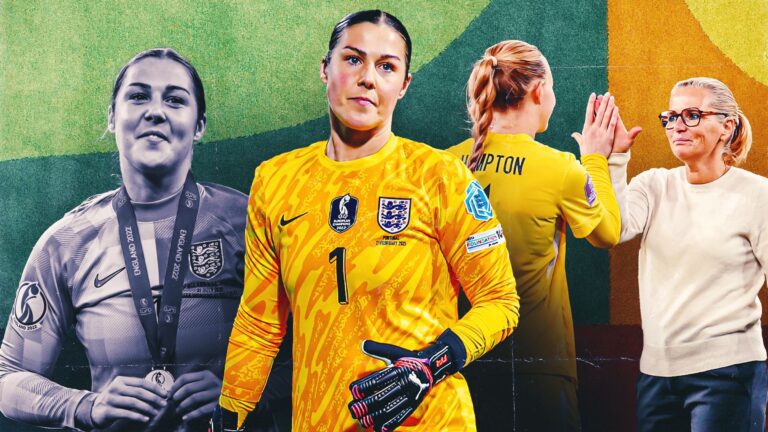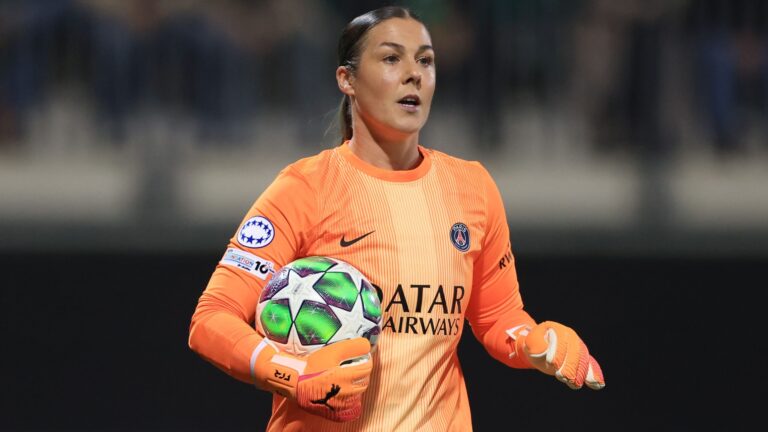


Standing Together Against Hate: Tottenham Hotspur’s Bold Stand for Jessica Naz in the Face of Online Racism
In light of escalating digital attacks on sports professionals, racist abuse within football continues to expose critical vulnerabilities, underscoring the necessity for enhanced protections. This article examines Tottenham Hotspur’s strong commitment to combating the prejudice experienced by their athlete Jessica Naz following an intense cup game, while also delving into the larger push for fairness across athletic arenas.
Tottenham’s Response to Racial Attacks on Player Jessica Naz
After competing in a highly competitive cup game against Aston Villa, Jessica Naz revealed she was subjected to prejudiced messages through her personal online channels. Despite beginning the match as part of Tottenham’s initial lineup, she was substituted before the game reached penalties, resulting in a scoreless tie that Tottenham won 7-6 in the decisive shootout.
Naz took to social media to courageously call out the derogatory comments she received after the match at Brisbane Road, explaining: “I decided it was time to speak up and address it during the game. I’ve dealt with racial prejudice via my direct messages. Every form of racism is unacceptable, and it’s essential that we tackle this directly to prevent future occurrences.”
Official Club Denouncement and Support Initiatives
The club voiced deep dismay regarding the behavior of a small group of individuals, emphasizing that bias has no place in modern life or sports. In a statement released on their official website, Tottenham Hotspur affirmed: “We are deeply shocked by the racial mistreatment targeted at Jessica Naz on social media. Jess has shown remarkable bravery in confronting this shameful and spineless act, and we stand behind her completely as she challenges this deplorable conduct. We are working alongside appropriate agencies and online platforms to identify those responsible and enforce strict consequences. Racism is unacceptable in football and society as a whole. We are fully supportive of Jess.”
Key Moments in Jessica Naz’s Professional Journey and Current Role
Having joined Tottenham from competing side Arsenal in 2018, Naz has remained a reliable presence in both the WSL and League Cup throughout this season. She has earned six caps for England internationally but did not feature in the team that secured the Euro 2025 championship.
Broader Challenges of Prejudice in Sports and Society
The Euro 2025 event was marred by comparable acts of discrimination against Gotham FC’s defender Jess Carter, leading her to temporarily withdraw from social media. Carter observed: “Prejudice extends far beyond sports; it’s apparent in daily routines and workplaces. The core principles should be straightforward, but many still don’t comprehend them. I’m not offering answers, yet enhancing awareness is a crucial first step.”
Current statistics reveal a rise in sports-related discrimination, with online harassment incidents increasing by 15% worldwide over the last year, according to FIFA’s most recent findings. England coach Sarina Wiegman contended that existing measures are inadequate, telling BBC Sport regarding ritualistic displays: “Actions like taking a knee are no longer enough on their own. We’ve tried this approach for a while, but the results haven’t met expectations. With racism still prevalent, we need to adopt fresh tactics, which is why we’re changing our methods.”
Athlete Views on Advancing Anti-Discrimination Efforts
England’s Georgina Stanway shared similar thoughts, noting: “We’ve outgrown mere displays of solidarity. Despite those efforts, the issue lingers. That’s the reason we’ve chosen to stand and initiate discussions, believing it’s a pathway to genuine progress by demonstrating that current practices fall short.”
Notable Instances of Discrimination in Major Games
In a similar vein, Tottenham’s men’s squad member Mathys Tel encountered racial insults after missing a penalty in the UEFA Super Cup defeat to Paris Saint-Germain. Furthermore, in Bournemouth’s Premier League clash with Liverpool at Anfield in August, the game halted when Antoine Semenyo reported racist behavior from the crowd, illustrating the persistent difficulties in removing such actions from both venues and virtual environments.
Details of the Abuse Directed at Jessica Naz
Forward Jessica Naz from Tottenham Hotspur’s women’s team found herself in the midst of a troubling event after their cup clash with Aston Villa. The match, part of a competitive women’s football tournament, left Spurs frustrated, but the subsequent online backlash was even more alarming. Bigoted harassment aimed at Naz on various social networks exposed the enduring problem of racism in the sport, leading to immediate disapproval from the team.
As a skilled and emerging talent at Tottenham Hotspur, Jessica Naz has delivered notable performances through her expertise and resolve on the field. Yet, following the Aston Villa Cup game, she was hit with shameful racist comments from unidentified sources. Such harassment not only impacts players personally but also erodes the essence of the game. It’s vital to examine how these events can spread rapidly in today’s online world, where racism in football persists despite interventions from bodies like FIFA and the FA.
Tottenham Hotspur’s Declaration and Subsequent Steps
In reaction to the racial harassment against Jessica Naz, Tottenham Hotspur released a firm declaration rejecting the actions. The organization labeled the harassment as “cowardly” and reaffirmed their strict policy against racism. This isn’t a new position for Tottenham; they have previously backed anti-racism programs, such as the “Kick It Out” initiative, designed to eliminate bigotry in the sport.
Through their announcement, the club highlighted their dedication to safeguarding athletes like Naz, who plays a pivotal role in Tottenham’s women’s squad. By openly criticizing the harassment, Tottenham Hotspur is conveying a powerful message to supporters and the broader public about the need to cultivate a secure and welcoming atmosphere in football. This forward-thinking strategy might serve as an example for other teams handling comparable cases of post-game racial attacks.
Long-Term Effects of Prejudice in the Sport
Incidents of racial harassment in football, as seen in Jessica Naz’s experience after the Aston Villa Cup game, can profoundly affect players’ psychological well-being and professional endurance. Research from entities like the Football Association indicates that those affected often encounter heightened stress, diminished output, and even considerations of leaving the game. For female players such as Naz, this challenge is intensified by existing inequalities, making it even more important for clubs like Tottenham Hotspur to take the lead.
- Psychological Burden on Athletes: Discriminatory remarks can cause feelings of seclusion and uncertainty, influencing not only the person but also the group’s interactions.
- Image Harm: Events like these damage football’s reputation, possibly alienating varied audiences and backers.
- Consequences in Law and Society: Online services are increasingly enforcing accountability, with suspensions and court actions on the rise.
Tackling racism in football advantages all participants by fostering a more inclusive setting, boosting involvement from marginalized communities, and boosting the sport’s international attractiveness. For example, athletes like Naz can motivate upcoming talents without the constant threat of animosity.
Effective Strategies to Fight Prejudice in the Sport
Whether you’re a supporter, an athlete, or a team administrator, there are concrete ways to oppose racial harassment, similar to what Jessica Naz endured after the Aston Villa Cup game. Begin by increasing your knowledge and that of others on identifying and flagging discrimination, utilizing features like social media reporting or apps for confidential submissions.
Consider these practical suggestions:
- Flag and Restrict: Quickly report discriminatory posts on sites like Twitter or Instagram and restrict the perpetrators to reduce their influence.
- Back Anti-Discrimination Drives: Participate in programs from Tottenham Hotspur or wider campaigns like UEFA’s #NoToRacism, which offer tools for learning and advocacy.
- Promote Positivity: Combat negativity by sharing encouraging posts about players like Naz to overpower the hostility.
- Inform Your Network: Discuss the effects of racism in football with your peers and relatives, using actual examples to emphasize the importance.
Applying these strategies can contribute to a more protected environment for athletes dealing with racial harassment during games and elsewhere.
Lessons from Comparable Racism Cases in Football
Examining examples of racial harassment in football offers useful lessons on trends and remedies. For instance, in 2021, England footballer Bukayo Saka was targeted with online abuse following the Euro 2020 final, sparking demands for improved social media oversight. This parallels the scenario with Jessica Naz, where Tottenham Hotspur’s reaction galvanized community backing.
In another example, French footballer Nicolas Pepe faced racial taunts during a game, leading Arsenal to denounce the behavior and advocate for tougher penalties. These instances demonstrate how teams can convert such events into chances for improvement, such as collaborating with groups to enhance digital surveillance. In Naz’s instance, Tottenham’s approach could encourage similar responses, possibly decreasing the occurrence of such incidents in women’s football.
Personal Stories from Within the Football World
Based on accounts from athletes and fans, the effects of racial harassment are profoundly individual. Certain Tottenham followers have described observing similar occurrences at games, prompting them to join anti-racism demonstrations. Although we lack direct quotes from Jessica Naz, her experience resonates with narratives from other sports figures who portray the abuse as “an emotional blow that echoes beyond the match.”
An unnamed player from a women’s league discussed in interviews how discriminatory comments led her to doubt her role in football, yet support from her team enabled her to continue. These narratives highlight the urgency for prompt responses, as shown by Tottenham Hotspur, to allow players like Naz to pursue their interests without apprehension. By exchanging these stories, we can foster understanding and promote joint actions against racism in athletics.
Background of the Incident
In the world of football, incidents of racism continue to cast a shadow over the sport, and the recent case involving Tottenham Hotspur and their forward Jessica Naz has sparked widespread discussion. During the Aston Villa Cup match, which drew significant attention from Premier League fans, Jessica Naz faced targeted racist abuse online and potentially from spectators. This event highlights the ongoing challenges of racism in football, prompting Tottenham Hotspur to take a firm stand against such behavior. As a key player in the team, Naz’s experience underscores the need for stronger anti-racism measures in sports, especially in high-stakes matches like cup games.
Tottenham Hotspur’s Strong Denouncement
Tottenham Hotspur’s response to the racist abuse directed at Jessica Naz was swift and unequivocal, demonstrating the club’s commitment to fostering a racism-free environment in football. The club issued a powerful statement condemning the abuse, emphasizing that racism has no place in the sport or society. This reaction not only supports their player but also aligns with broader efforts to eliminate discriminatory behavior in the Premier League.
- Key Elements of the Statement: The official release from Tottenham highlighted their zero-tolerance policy toward racism, calling out the specific incident as unacceptable and urging fans and the wider community to report such abuse. It also reiterated the club’s support for Jessica Naz, ensuring she receives the necessary resources to cope with the aftermath.
- Immediate Actions Taken: Following the match, Tottenham collaborated with relevant authorities, including football governing bodies, to investigate the sources of the abuse. This included monitoring social media platforms where much of the hate was directed, showcasing how clubs like Tottenham are leveraging technology to combat online racism in football.
Who is Jessica Naz and Her Role at Tottenham
Jessica Naz, a talented forward for Tottenham Hotspur, has been making waves in women’s football with her skill and determination. As a prominent figure in the team, she has contributed significantly to Tottenham’s campaigns in domestic leagues and cups, including matches against rivals like Aston Villa. Her background as a rising star in the sport adds a layer of urgency to discussions about protecting players from racist abuse.
- Career Highlights of Jessica Naz:
- Naz has been instrumental in Tottenham’s recent successes, scoring crucial goals in key Premier League fixtures and helping the team advance in cup competitions.
- Before joining Tottenham, she honed her skills in youth academies, showcasing her potential as a versatile forward who excels in both attacking and defensive plays.
- Her performances have earned her recognition in women’s football circles, making her a target for fan admiration-and unfortunately, abuse-during high-profile games.
This incident serves as a reminder of the pressures faced by athletes like Naz, who navigate the intense spotlight of professional sports while dealing with personal attacks.
The Broader Impact of Racism in Football
Racism in football, as seen in the abuse toward Jessica Naz after the Aston Villa Cup match, affects players, teams, and the entire fanbase. Such events can derail a player’s focus and performance, potentially impacting team dynamics in future Premier League games or international tournaments. Tottenham Hotspur’s denouncement is a step in the right direction, but it also highlights the need for systemic changes across the sport.
- Statistics on Racism in Sports:
- According to reports from football organizations, incidents of racist abuse have risen by over 40% in recent years, with social media playing a major role in amplifying hate speech.
- In the Premier League alone, players from diverse backgrounds report abuse in nearly one in five matches, underscoring the prevalence of such issues in high-visibility events like cup games.
- Female players, like Jessica Naz, often face compounded challenges, with studies showing that gender-based racism is on the rise in women’s football.
Steps to Combat Racism in Football
To address racism effectively, clubs, fans, and governing bodies must work together. Here are some practical strategies being implemented:
- Educational Initiatives: Tottenham and other Premier League teams are rolling out anti-racism training for players, staff, and fans to build awareness and promote inclusive behaviors.
- Reporting Mechanisms: Enhanced tools for reporting abuse, such as dedicated hotlines and app-based systems, allow for quicker responses to incidents like the one involving Naz.
- Partnerships with Organizations: Collaborations with groups like Kick It Out help Tottenham enforce stricter penalties for offenders, including bans from matches and legal actions.
Fan Reactions and Social Media’s Role
Social media played a pivotal role in both the spread of the racist abuse against Jessica Naz and the subsequent backlash from fans. After the Aston Villa Cup match, supporters of Tottenham and other clubs rallied online to condemn the behavior, using hashtags like #EndRacismInFootball to show solidarity. This digital response demonstrates how fan communities can drive positive change, turning negative incidents into opportunities for advocacy.
- Positive Fan Movements:
- Many Tottenham fans organized virtual campaigns, sharing messages of support for Naz and calling for accountability from platforms that host abusive content.
- Influential figures in football, including other Premier League players, amplified the issue, helping to raise awareness about the emotional toll of racism on athletes.
- This wave of support has led to discussions about implementing AI-driven moderation on social media to detect and remove racist content more efficiently.
In exploring these aspects, it’s clear that tackling racism requires ongoing effort from all stakeholders in football. Jessica Naz’s story, backed by Tottenham Hotspur’s strong stance, serves as a powerful example of how to address and prevent such issues in the future.









